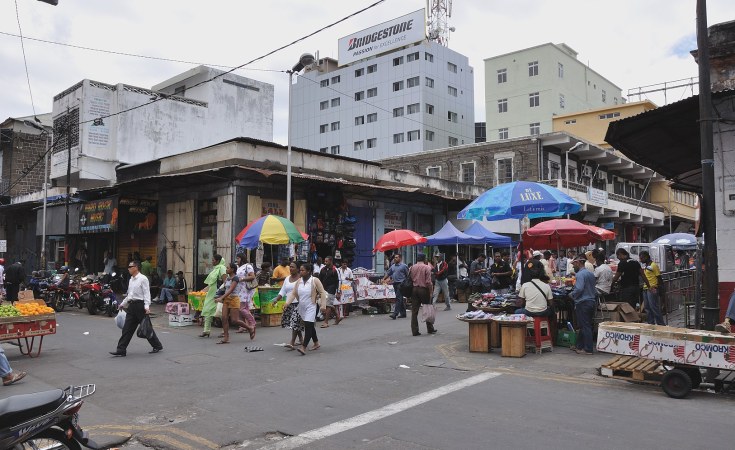Cost of living protests descended in riots last month. Food and fuel prices are set to rise further.
In late-April, protests against the soaring cost of living erupted in cities across Mauritius. In Beau Bassin, Rose Hill, and the capital Port Louis, large groups of frustrated residents - particularly from low-income neighbourhoods - took to the streets.
These demonstrations were largely peaceful to begin with, but tensions rose sharply after Louis Dominique Seedeeal, an activist who had allegedly participated in an "illegal protest", was arrested. In Port Louis, several hundreds of demonstrators defied Covid protocols as they congregated in front of the police headquarters to demand his release. The crowd was eventually dispersed with tear gas and batons, sparking violence in the surrounding area and fresh protests in other parts of the country. Riots spread and the police deployed armoured vehicles.
By the time calm returned, several police cameras, vehicles and property had been broken or destroyed. In Beau Bassin, a newly built light rail station was facing 13 million rupees' ($300,000) worth of damage. One civilian was in intensive care, and 13 police officers had been wounded.
In the aftermath of the protests, some media outlets depicted the unrest as an expression of ethnic resentment among the Kreol minority and likened the events to the 1999 riots. This interpretation was partly prompted by a statement made by Prime Minister Pravind Jugnauth who suggested the protests had been provoked by the political opposition and alluded to opposition leader Rama Valayden's "expertise" in riots. In 1999, Valayden organised a concert in support of the decriminalisation of cannabis. At the rally, the prominent Kreol singer Kaya smoked a joint on stage and was arrested. Kaya's death in custody sparked four days of riots and inter-ethnic violence.
For many observers, however, the drawing of this parallel is wholly misleading and distracting.
"For the government, people cannot react without being manipulated - that's ridiculous," says Father Filip Fanchette, a Catholic priest who oversaw Roche Bois, the epicentre of the 1999 riots. "No comparison can be made between the late incidents with the riots of February 1999. The present riots can be explained by the ever-rising prices."
Jean-Claude de l'Estrac, a former Minister of Commerce and Foreign Affairs and former newspaper editor, concurs.
"The violence we witnessed is indeed the expression of exasperation and rage," he says. "It erupted in the neighbourhoods with the highest concentration of people in difficulty."
As in countries across the world, Mauritius' economy has been hit hard by the Covid-19 pandemic and Russia's invasion of Ukraine. The rupee has lost 20% of its value against the dollar since the start of 2020. The government has hiked up fuel prices four times in six months and increased public transport costs by 25-40%. Inflation is rising and the economy is still rebuilding after a 15% contraction of GDP in 2020 amid strict Covid restrictions.
This set of factors has left ordinary citizens struggling to make ends meet. Dorina Caethane, a 43-year-old mother of five, can barely afford to feed her family despite both her and her husband having decent paying jobs.
"A bunch of watercress now costs 25 rupees ($0.60)," she says. "Sometimes, we go to sleep with some thin soup."
Claudette Madré, a 65-year-old pensioner is also finding living hard despite her middle-class background.
"My husband and I used to go to the grocery store each month," he says. "Now we are chasing sales. We look where food is more affordable."
Is the government listening?
In response to the cost of living crisis, the Mauritian government has invested millions of rupees to subsidise basic foods and is expected to announce further supportive measures in its national budget in early-June. For now, however, many Mauritians believe the government's actions have been insufficient and see the ruling Militant Socialist Movement (MSM) as out of touch.
The opposition has tried to capitalise on this. It has called for elections and tax cuts, and it organised a motion of no confidence in the government that was voted down on 13 May. This week, the opposition party Linion Pep Morisien (LPM) also called on drivers to participate in a "go slow" protest through the streets of Port Louis in response to the latest 10% rise in fuel prices. The slow-moving convoy, headed by activist Bruneau Laurette at the wheel of a BMW, only attracted a couple of dozen cars.
Despite this protest falling flat, de L'Estrac says the level of popular discontentment in the country is high and that further riots could erupt at any moment, especially with more price rises expected. Nonetheless, he emphasises that Mauritius is in a better situation than countries such as Sri Lanka, where the worst economic crisis in its history has seen fuel price increases of 137% in six months.
"Some comparisons are being made with the situation prevailing in certain countries," says de L'Estrac. "Luckily, the Mauritian case is not the same. Measures have been adopted to help vulnerable groups and more are to come with the 2022-2023 Budget."
For Fanchette, it is critical that the government do more, but he also emphasises the importance of treating citizens with respect and taking their concerns seriously. The recent riots, he suggests, were not just a response to economic desperation but an overriding belief that the government doesn't understand or care.
"Instead of sending the police and the SMF [Special Mobile Force], a personality who is highly respected should have been dispatched to talk to the people to tell them he understands their predicament and what steps will be taken to help them," he says. "When people feel lost, they resort to revolt."
Vel Moonien is a Mauritian journalist with over 25 years experience.


